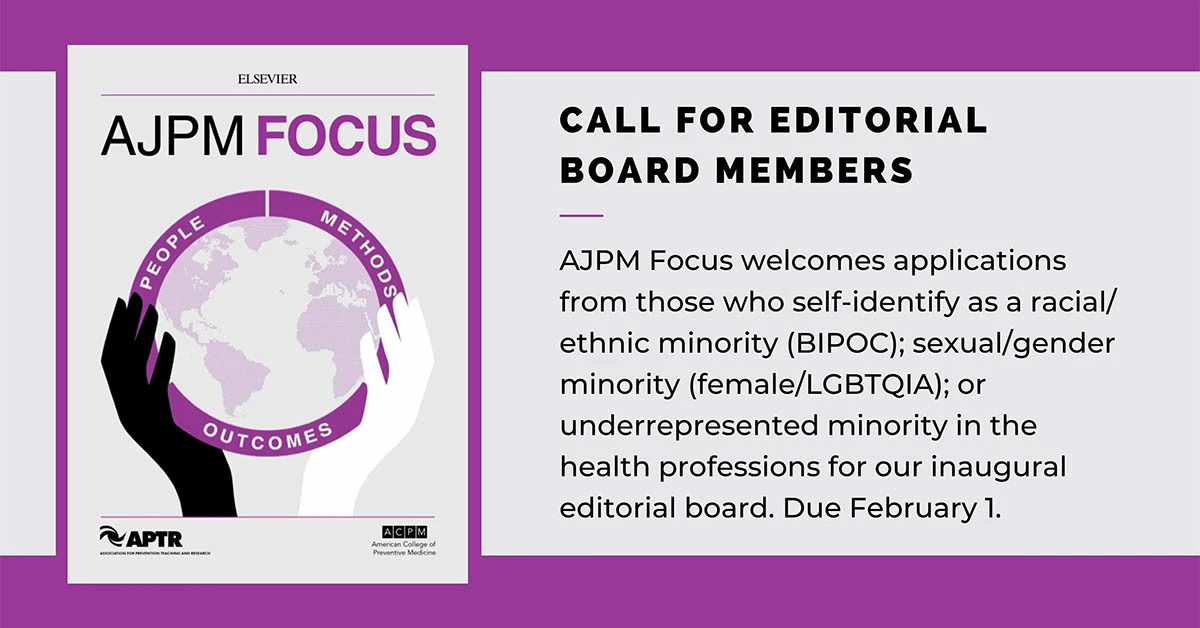7 steps to creating a journal with inclusivity as a founding principle
2023年3月14日
Kate Williamson, MLIS

Here’s a practical guide to starting a journal centered around inclusivity — based on the new open access journal AJPM Focus
The accuracy and impact of science depends on diverse perspectives, from the authors designing and conducting the research to the study subjects themselves. That principle was behind the creation of AJPM Focus — the new open access companion journal to the American Journal of Preventive Medicine (AJPM).
In developing the scope and the ethos for AJPM Focus, Founding Editor Dr Yuri Jadotte put inclusivity front and center.
"The scientific discourse often leaves out people from marginalized or disadvantaged social groups. Research funding favors quantitative methods at the expense of other scholarly perspectives, and journals implement novelty and impact thresholds when deciding what they will accept. How can we be intentional in our approach to reduce or eliminate these persistent areas of exclusivity?"

YJ
Yuri Jadotte, MD, PhD, MPH, FACPM
Founding Editor, American Journal of Preventive Medicine (AJPM)
AJPM Focus is an inspiring case study for fostering inclusivity in a journal setting.
AJPM and AJPM Focus are official journals of the American College for Preventive Medicine (ACPM) and the Association for Prevention Teaching and Research (APTR). And the focus on inclusivity resonates with both their missions.
"Ensuring there is diversity, equity and inclusion across all aspects of the work of the College is essential,” said Donna Grande, CEO of ACPM, “and the approach of this new journal aligns perfectly with our values and strategic imperatives.”

Donna Grande, MGA
Allison Lewis, Executive Director of APTR, added: "Launching a journal with such a focus on inclusivity dovetails nicely with the overarching mission of the APTR to lead innovation in prevention and public health education. AJPM Focus will further the APTR policy agenda of providing support for academic units of public health and prevention to increase teaching capacity, conduct research, and advocate regarding health inequities and racism. The work of AJPM Focus aligns with APTR efforts to ensure a more diverse and equitable teaching and learning environment, including creating welcoming and supportive settings for all students, faculty, and staff."

Allison Lewis
Here are some practical suggestions and examples from AJPM Focus on how to consider inclusivity at all steps of journal strategy and operations.
Incorporate inclusivity in the vision for the journal: To ensure inclusivity is considered when developing strategy and setting priorities, incorporate inclusivity as a fundamental part of your journal’s vision. Dr Jadotte sets forth the vision for AJPM Focus in his
introductory editorial: “AJPM Focus envisions a world where prevention teaching, research, and practice are all grounded in a sound body of evidence that is inclusive of all scholarly methodologies, scientific perspectives, and equitable approaches to improving population health outcomes.”
Inclusivity in scope: Consider how the scope of your journal can expand to include new types of research and other scholarly articles that would bring diverse viewpoints and voices. Also consider your society’s membership. Are there article types or subject areas that would allow a new section of your membership to contribute as authors? AJPM Focus achieves this by accepting submissions in all areas of preventive medicine and public health research, as well as scholarly articles addressing implementation, quality improvement, and policy, for example.
Editorial Board diversity: Explicitly welcome editorial board applications from traditionally underrepresented groups. Include editorial board members with different job profiles (such as both researchers and practitioners) and at various career levels. Set targets and measure performance. Almost 70% of AJPM Focus’ inaugural editorial board self-identify as members of underrepresented groups, and career experience ranges from students to tenured faculty. (See our call for editorial board members above.)
Use of tools and checklists: AJPM Focus requires authors to complete the relevant JBI Critical Appraisal checklist, ensuring authors are following best practices for reporting their research. These checklists can be a teaching tool for early career authors and enable clear and consistent criteria across submissions that use similar methodologies.
Reduce bias in peer review: AJPM Focus opts for a double-anonymized peer review process to minimize potential or implicit bias.
Waiver policy: To include research and researchers who have not traditionally been well-funded, gives priority to disadvantaged scholars and disadvantaged scholarship when allocating editorial APC waivers.
Communicate your commitment: Lastly, be sure your journal community knows about your commitment to inclusivity, including any specific actions you are taking. In addition to setting the scene for inclusivity in Dr Jadotte’s editorial, the AJPM Focus tagline of “Inclusivity in People, Methods, and Outcomes” is prominently displayed on the first page of all articles.
Although still in its early days, the signs are that AJPM Focus is destined for success using the winning formula of publishing insightful research in an inclusive manner.
